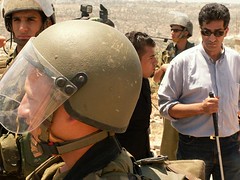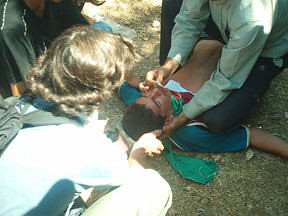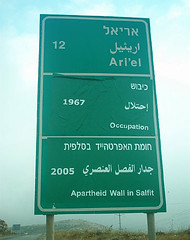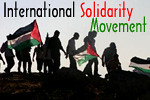A Chat with the Shabak
Around a week ago, I got a call from the Giv’at Ze’ev police, asking me to come in to 'clarify some technical details' about my arrest at a demonstration in the village of Bil’in a few weeks ago. By the time I showed up at the police station, on Sunday, June 26th, I had figured out that that interview would have nothing to do with the police. The shabak (Israel’s equivalent of the FBI) wanted to 'have a chat'. That was, in fact, the exact phrase they used: "This is not an interrogation. We just wanted to have a chat and pass you a message."
When I arrived at the police station, I was put in an interview room with a non-uniformed man, who stated his name was El’ad. After the usual body search, my phone and bag were taken away, though I was (generously) allowed to keep a drink I had bought earlier. Another non-uniformed man arrived and 'El’ad' passed him a note.
'El’ad' proceeded to tell me that they know I am associated with the ISM and that I am in touch with 'extremist' Israelis, internationals, and Palestinians. He asked me for a response, and I stated that I am indeed an activist, but that I do not associate with any particular group. Apparently, the super-geniuses at the shabak had googled my name and found out otherwise. I was suitably impressed.
I was then informed that I was 'on the brink of an abyss' (later corrected to 'you have one foot half-way down the abyss'), and that I was on the border of becoming a 'danger to state security'. They seemed to think that I would soon be carrying bombs and ferrying wanted men into Israel. They brought up a case from 1986 when a woman was given a bomb by her Palestinian boyfriend. I was six years old at the time…
At one point, the other man in the room shouted at me for a while, more or less repeating what 'El’ad' had said, though in a much louder voice. He then proceeded to stare at me for the rest of the interview. While the effect was meant to be intimidating, I found it rather amusing. The entire 'good-cop/bad-cop' routine was entertainingly predictable. I seemed to throw the 'bad-cop' off a little when I asked for his name, which he gave as Eyal.
I was told that they were now taking me very seriously, that I am no longer an 'ordinary activist', that I had 'gone up a couple of steps', that I had 'a large spotlight' pointed at me, that not every activist gets invited to a shabak 'chat', that up to now I had been toying with the law, but they would no longer allow that. They advised me to 'go to the beach for a while'.
The entire process took less than twenty minutes. I was shown out of the police station by a rather nervous-looking 'El’ad'. I didn’t head to the beach…
Posted by Rann
When I arrived at the police station, I was put in an interview room with a non-uniformed man, who stated his name was El’ad. After the usual body search, my phone and bag were taken away, though I was (generously) allowed to keep a drink I had bought earlier. Another non-uniformed man arrived and 'El’ad' passed him a note.
'El’ad' proceeded to tell me that they know I am associated with the ISM and that I am in touch with 'extremist' Israelis, internationals, and Palestinians. He asked me for a response, and I stated that I am indeed an activist, but that I do not associate with any particular group. Apparently, the super-geniuses at the shabak had googled my name and found out otherwise. I was suitably impressed.
I was then informed that I was 'on the brink of an abyss' (later corrected to 'you have one foot half-way down the abyss'), and that I was on the border of becoming a 'danger to state security'. They seemed to think that I would soon be carrying bombs and ferrying wanted men into Israel. They brought up a case from 1986 when a woman was given a bomb by her Palestinian boyfriend. I was six years old at the time…
At one point, the other man in the room shouted at me for a while, more or less repeating what 'El’ad' had said, though in a much louder voice. He then proceeded to stare at me for the rest of the interview. While the effect was meant to be intimidating, I found it rather amusing. The entire 'good-cop/bad-cop' routine was entertainingly predictable. I seemed to throw the 'bad-cop' off a little when I asked for his name, which he gave as Eyal.
I was told that they were now taking me very seriously, that I am no longer an 'ordinary activist', that I had 'gone up a couple of steps', that I had 'a large spotlight' pointed at me, that not every activist gets invited to a shabak 'chat', that up to now I had been toying with the law, but they would no longer allow that. They advised me to 'go to the beach for a while'.
The entire process took less than twenty minutes. I was shown out of the police station by a rather nervous-looking 'El’ad'. I didn’t head to the beach…
Posted by Rann









